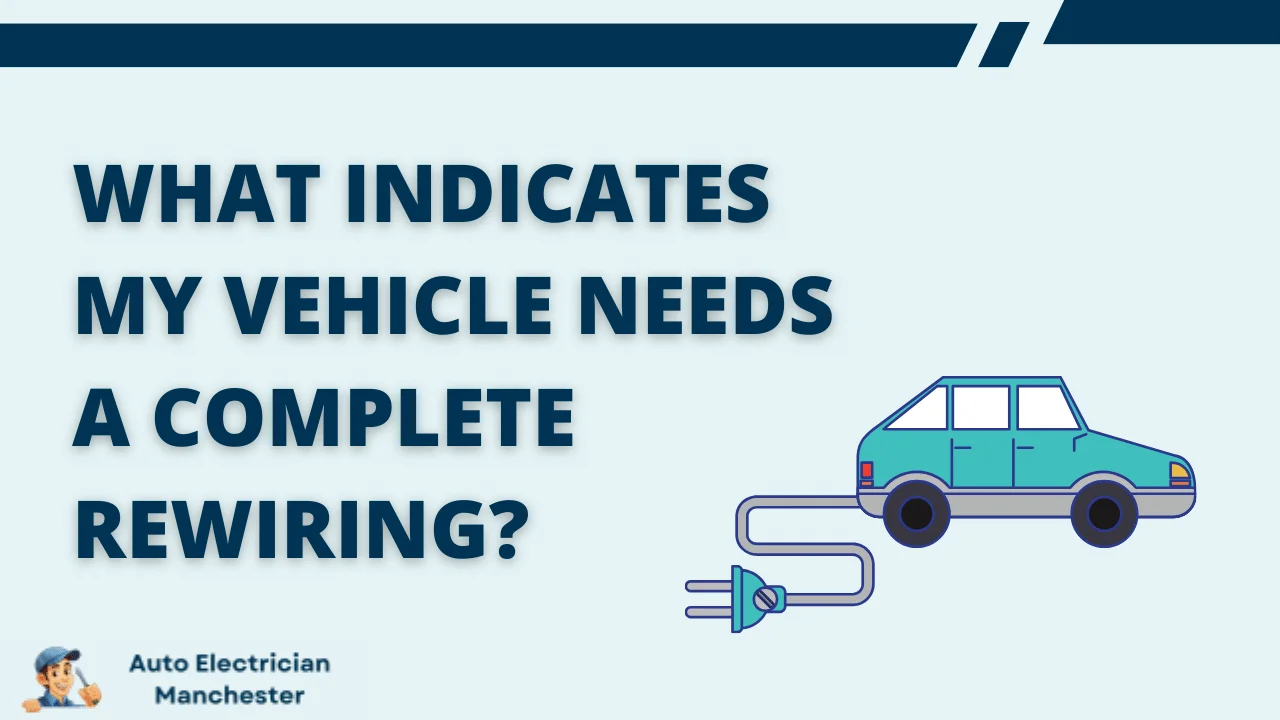
A healthy electrical system is the lifeblood of your car, silently orchestrating a symphony of functions that keep you rolling safely. But what happens when the music sputters and strange electrical gremlins appear? Fear not! This guide will illuminate the signs that might indicate your car needs a complete rewiring, empowering you to make informed decisions for your vehicle’s well-being.
Understanding Rewiring: A Solution, Not a Sentence
A complete rewiring might seem daunting, but it’s a powerful solution that addresses underlying electrical issues before they snowball into bigger problems. Think of it as a system refresh, ensuring your car’s electrical pathways are clear and delivering optimal power where it’s needed most.
When the Lights Dim and Gauges Go Haywire?
Malfunctioning electrical components are the first whispers of potential trouble. Keep an ear out for these electrical gremlins:
Inconsistent Illumination: Dimming or flickering headlights, taillights, or interior lights suggest loose connections or failing wires.
Gauges Gone Wild: Erratic readings on your speedometer, fuel gauge, or temperature gauge can indicate faulty wiring sending incorrect signals.
Power Play Problems: Power windows or locks that malfunction repeatedly despite repairs could point to wiring gremlins lurking within the system.
If you experience these issues consistently, don’t ignore them. A visit to a trusted mechanic can help nip the problem in the bud before it escalates.
Burning Odors and Smoke Signals
Our sense of smell can be a powerful diagnostic tool. Here’s what a burning odor or smoke might signify:
Burning Plastic Alert: A burning plastic smell emanating from your car can indicate overheating wires due to overloaded circuits or failing insulation. This is a serious fire hazard and requires immediate attention from a qualified mechanic.
Smoke Signals: Smoke coming from the dashboard or steering column is a definite red flag. It signifies a severe electrical malfunction that necessitates immediate professional diagnosis and likely a complete rewiring. Don’t hesitate – pull over safely and call for assistance.
Remember, early detection is key. Addressing these warning signs promptly can prevent a minor issue from turning into a major inconvenience or safety hazard.
A Visual Inspection for Wiring Woes
Sometimes, the problem lies in plain sight. Take a peek under the hood for any signs of physical wiring damage:
Frayed or Exposed Wires: Exposed wires are vulnerable to the elements and increase the risk of electrical shorts and fires.
Melted Wire Casings: Melted casings indicate overheating wires, often caused by overloaded circuits or failing components.
Signs of Rodent Activity: Rodents love to chew on wires, and their handiwork can wreak havoc on your car’s electrical system.
If you spot any of these signs, don’t attempt repairs yourself. Consult a qualified mechanic to assess the damage and determine the best course of action.
When a New Battery Isn’t Enough?
A car that struggles to hold a charge or experiences frequent dead batteries, even after a new battery is installed, might have a hidden culprit: faulty wiring. Here’s how it can drain your battery:
Hidden Current Drain: Damaged or malfunctioning wires can create a constant trickle of power drain, slowly sapping your battery’s life.
Loose Connections: Loose or corroded connections at the battery terminals can impede the flow of electricity, hindering the battery’s ability to charge properly.
If you suspect a wiring issue might be draining your battery, a trusted mechanic can diagnose the problem and recommend the most suitable solution.
When The Fix Isn’t Always a Complete Overhaul?
A complete rewiring might seem like the answer to all your electrical woes, but it’s not always the most practical solution. Here are some alternative approaches to consider:
Targeted Repair: In many cases, the issue might be localized to a specific circuit or component. A skilled mechanic can diagnose the problem and perform a targeted repair, replacing faulty wires or components without needing a complete overhaul. This is often a more cost-effective solution, especially if the problem is isolated.
Fuse Box Frenzy: Sometimes, a blown fuse is the culprit behind electrical malfunctions. Fuses act as safety devices, designed to sacrifice themselves in case of a surge or overload. Consult your car’s owner’s manual to identify the specific fuse responsible for the malfunctioning component and replace it with a fuse of the same amperage rating. Remember, never replace a blown fuse with one of a higher rating, as this can bypass safety measures and lead to further damage.
Cleaning Up Connections: Corrosion can build up on electrical connections over time, creating resistance and hindering the flow of electricity. A mechanic can meticulously clean these connections, restoring proper electrical flow and potentially resolving the issue without needing a complete rewiring.
Signs a Complete Rewiring Might Be Necessary
While targeted repairs and troubleshooting can often address electrical problems, there are situations where a complete rewiring becomes the most viable option:
Extensive Damage: If your car has suffered significant fire damage, rodent infestation, or water damage, the electrical system might be extensively compromised. A complete rewiring might be necessary to ensure the safety and functionality of your vehicle.
Chronic Electrical Nightmares: If you’re constantly battling electrical gremlins, experiencing recurring malfunctions across multiple systems, and have exhausted targeted repairs, a complete rewiring might be the most effective solution to restore your car’s electrical health.
Preventative Maintenance for Classics: For older cars, especially those with collector’s value, a preventative rewiring can be a wise investment. Over time, insulation on wires can become brittle and prone to cracking, and preventative rewiring can safeguard against future electrical problems.
Conclusion
A healthy electrical system is the backbone of a car’s performance. By understanding the warning signs of potential problems, taking proactive steps to address them, and consulting a qualified mechanic when needed, you can keep your car running smoothly and safely for miles to come. Remember, early detection is key! Don’t hesitate to seek professional help if you suspect electrical issues, as a minor problem can snowball into a major inconvenience or safety hazard if left unattended. With a little knowledge and a proactive approach, you can ensure your car’s electrical system stays charged up and ready to roll.
FAQ
What are some warning signs of car electrical problems?
Look out for dimmed headlights, flickering interior lights, strange electrical smells, or malfunctioning electronics like power windows or radios. These could indicate a failing battery, alternator, or wiring issues.

David Mack is a seasoned writer with a passion for the auto electrician niche. With years of hands-on experience and a knack for demystifying complex topics, David brings practical insights to his readers. Whether you’re a professional or a car enthusiast, his engaging articles offer valuable tips and trends in auto electrical systems.
